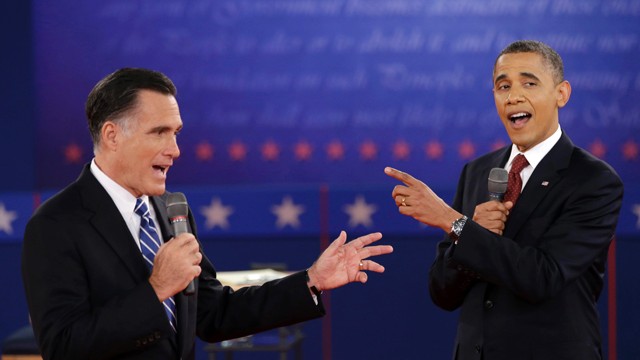As Hurricane Sandy inflicts its damage along the American Northeast, another sobering set of "perfect storm" conditions is approaching the Middle East and threatening its inhabitants.
This storm is less certain to develop than relatively predictable weather patterns, but Mitt Romney has managed to stay within striking distance of an upset over President Barack Obama and is currently forcing a tie on pollsters. Romney's victory seems implausible despite his rise in the polls; putting aside Obama's own loss of Democratic support, the American public must undertake a leap of faith in order to approve Romney's entry to the Oval Office. However the Republican challenger is now running neck and neck with Obama, setting the stage for a tight finish and chaotic outcomes.
The effects of Romney's potential victory on U.S. foreign policy are difficult to fully ascertain. His emphasis on an "American Century" and defense spending suggests that Romney will pursue a more overt projection of American power than Obama. Or, given his similarities with Obama, U.S. foreign policy may change styles more than substance in crucial areas: Russia, India, China and the Pacific, North Africa and the Middle East. Their responses to Afghanistan's war, the Arab revolutions and Israeli-Palestinian conflict are left virtually identical after stripping away their personal rhetoric. Romney couldn't agree with Obama's assassination "matrix" fast enough during last Monday's foreign policy debate.
Of their many "differences," though, Obama and Romney's contingencies towards Iran ring truest and hold the potential to affect both hemispheres. Here Romney has struck hardest to distance himself from Obama's “dual track" of containment and diplomacy, which the GOP challenger concedes as necessary but also criticizes as a dead end. A win for Romney pushes the odds of war with Iran to their peak. He doesn't tolerate a sliver of daylight between Jerusalem and has consistently defended Israel's "red-line" on uranium enrichment - slandering Obama for throwing Israel "under the bus" in the process. Loaded with players of George Bush's administration, Romney's circle appears even more gung-ho to bomb Iran's nuclear facilities and has awaited this exact window (2012-2016) to open.
Obama's second term would delay, although not necessarily prevent, an open conflict with Iran. Romney is already playing chicken before his first.
War between America, Israel, Iran and all of their proxies represents a worst-case scenario for the Middle East. One party's unilateral actions can trigger this disastrous outcome, whereby Obama's administration is leveraged into Israel's defense, except two keys are more likely to turn the engine. Washington and Jerusalem are certain to close ranks before a preemptive strike; regardless of their private disagreements, a unilateral decision to bomb Iranian targets is theoretically impossible. That said, a war on this scale may be carried out less effectively by divided leadership, and Obama has experienced his share of trouble with Israeli Premier Benjamin Netanyahu throughout their terms.
The only trouble expected by a Romney-Netanyahu ticket is how to sell a massive war to their publics. These "old friends" can "almost speak in shorthand" when discussing Iran and other regional issues.
Unpopular with his own people, Western capitals, human rights groups and individuals of all nationalities, Benjamin Netanyahu continues to defy the political odds in his quest for permanent authority. 2011 saw the brief rise and fall of a protest movement for affordable housing. Earlier this year Israel's Kadima party quit his coalition, citing a range of disagreements from military conscription to West Bank settlements and negotiations with the Palestinians. Some commentators believe that Netanyahu's abuse of Obama has made no difference to Israelis, but Americans have generally tired of Netanyahu and so too have the Israelis sitting outside his orthodox voting base.
Now, after announcing an early election in January, Netanyahu has been pegged as the clear frontrunner against a weak field of contenders. The deal between his Likud Party and Avigdor Lieberman's Yisrael Beitenu seals a nightmare ticket for the Palestinians, whom Netanyahu and Lieberman hold responsible for the current breakdown in negotiations. Neither politician will expend any genuine effort to resolve the longstanding crisis - building up Israeli settlements in Jerusalem is a higher priority - for they will be too busy plotting war against Iran and politicking against their own people.
"We are facing great challenges and this is the time to unite forces for the sake of Israel," Netanyahu explained at a news conference. "Therefore Likud and Yisrael Beitenu will run together on the same ticket in the next elections. We are asking for a mandate from the public to lead Israel against security threats, above all preventing Iran from arming itself with nuclear weapons and the struggle against terror."
The elusive dream of world peace would face a great challenge if Romney and Netanyahu manage to unite their forces.






